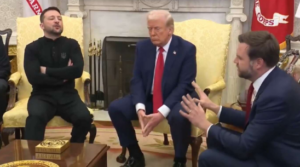The Political Chessboard: Zelensky’s Maneuvers Against Trump and Broader Implications

In the rollercoaster world of international politics, few figures elicit as much debate and intrigue as Ukrainian President Volodymyr Zelensky. Recently, a series of events unfolded that warranted not just attention but a deeper analysis of the geopolitical repercussions at play, particularly concerning U.S. relations with Ukraine and its implications for the global balance of power.
Understanding the Context: Zelensky’s Intentions
It has been reported that several days prior to a highly publicized meeting at the White House, Zelensky was aware of the optics he wished to create—namely, that of a public confrontation intended to embarrass former President Donald Trump. This was not merely an impulsive decision but rather a calculated move in a broader strategy to keep American assistance flowing into Ukraine’s protracted conflict.
Zelensky’s request for a public meeting was laced with expectations that he could leverage a sympathetic media landscape against Trump. Given the narrative traditionally portrayed by much of the media, the Ukrainian leader may have believed he could twist the appearance of this meeting to serve his own ends, casting Trump in an unfavorable light and compelling the U.S. to continue its financial backing of Ukraine.
However, Trump’s preparation for the encounter underscores a critical aspect of his political persona—his ability to confront anticipated challenges head-on. Unlike his predecessor, Trump does not rely on teleprompters, which adds an element of spontaneity and unpredictability to his responses.
Significance of European Ambitions
There is a deeper narrative at play beyond this individual encounter. Reports suggest that the European Union has set its sights on redefining the global order, aiming to supplant the United States as the primary leader of the free world. French President Emmanuel Macron has been vocal about this ambition, hinting at a strategic reshaping of alliances and influence.
The historical context is equally fascinating and troubling. If we consider past conflicts, such as the Crimean War, World War II, and our current decade, there’s an eerie pattern that can potentially predict significant geopolitical shifts. Each significant conflict has occurred roughly 86 years apart, mirroring a cyclical pattern of European ambition—this raises the question: could 2025 herald another seismic shift?
The Aftermath: Zelensky’s European Outreach
Post-meeting, Zelensky’s outreach efforts emphasized the precarious state of U.S.-Ukraine relations. Text messages were dispatched to European leaders, possibly sowing discord further by painting America as an unreliable ally during a critical time. For Zelensky, garnering support among anti-American factions within Europe is likely viewed as essential to reinforcing his position and ultimately advancing the conflict agenda against Russia.
In an age where political capital is as crucial as military strength, Zelensky’s gestures may have positioned him favorably within European leadership circles, garnering sympathy and support that could empower his cause on the global stage.
A Call for Strategic Review
Given these developments, it’s perhaps timely to consider the implications of U.S. foreign aid and military commitments. Some experts argue that it may be prudent for the United States to reassess its financial support for Ukraine, especially in light of how domestic political sentiments in Ukraine have evolved. Cooperation with a leader who appears increasingly disconnected from certain segments of their own populace raises significant questions.
At Extreme Investor Network, we call for a thorough evaluation of U.S. commitment in such international engagements. While our historical allies deserve support, it’s essential that this support comes with accountability and recognition of the evolving political landscape.
Conclusion: The Broader Implications for Investors
For savvy investors, these developments are not just political stories; they are opportunities to understand shifts in geopolitical dynamics that could impact markets and economies. It’s vital to monitor how these relationships evolve, as they could reshape the global economic landscape.
As the world watches with bated breath to see how this high-stakes political chess match unfolds, one thing remains clear: understanding the interplay of these maneuvers will be essential for any investor looking to navigate the complexities of a possibly redefined world order. Subscribe to Extreme Investor Network for ongoing insights and expert analysis that go beyond surface-level observations.

